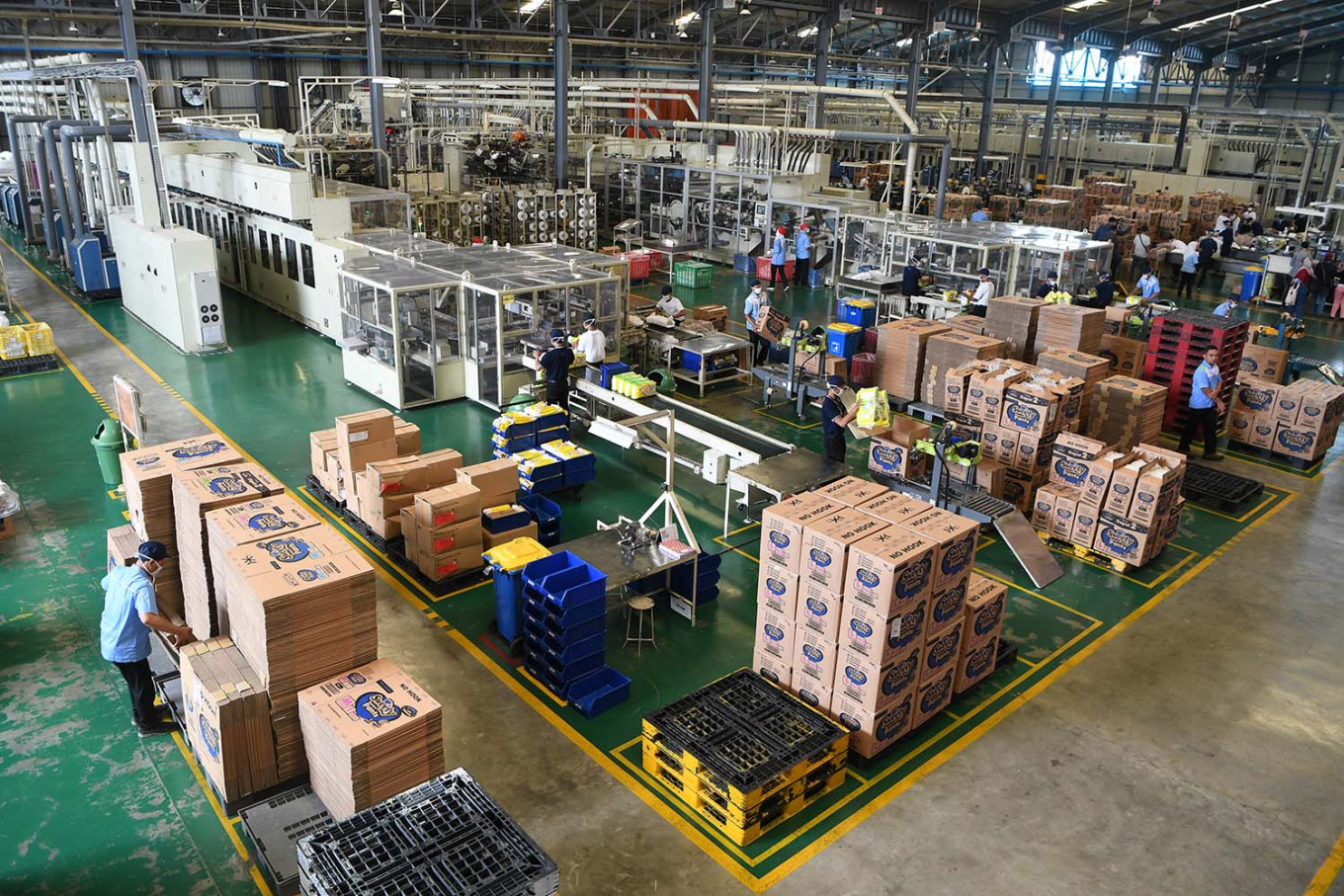Popular Reads
Top Results
Can't find what you're looking for?
View all search resultsPopular Reads
Top Results
Can't find what you're looking for?
View all search resultsIndonesia's factory activity at record low as COVID-19 paralyzes business
IHS Markit announced on April 1 that Indonesia’s Purchasing Managers Index, the gauge for manufacturing activities, slumped to 45.3, the worst in the survey's nine-year history.
Change text size
Gift Premium Articles
to Anyone
 Staff work at personal care manufacturer PT Softex Indonesia's factory in Sidoarjo, East Java, on Jan. 23. IHS Markit announced on April 1 that Indonesia’s Purchasing Managers Index, the gauge for manufacturing activities, slumped to 45.3, the worst in the survey's nine-year history, as COVID-19 spread. (Antara/Zabur Karuru)
Staff work at personal care manufacturer PT Softex Indonesia's factory in Sidoarjo, East Java, on Jan. 23. IHS Markit announced on April 1 that Indonesia’s Purchasing Managers Index, the gauge for manufacturing activities, slumped to 45.3, the worst in the survey's nine-year history, as COVID-19 spread. (Antara/Zabur Karuru)
I
ndonesian manufacturing output fell off a cliff in March as the government imposed stricter measures to contain the COVID-19, a survey has showed.
IHS Markit announced on April 1 that Indonesia’s Purchasing Managers Index (PMI), the gauge for manufacturing activities, slumped to 45.3, the worst in the survey's nine-year history. An index reading above 50 reflects an expansion, while a value below 50 indicates a contraction.
"Under stricter antivirus measures, demand weakened sharply at the end of the first quarter. New business inflows fell at the fastest rate in the series history, dragged down by a plunge in export sales," the survey statement reads. "At the same time, factory shutdowns led to a marked drop in production, with output also falling at a survey record rate."
The headline PMI drop was roughly indicative of GDP growth slowing to an annual rate of 4.6 percent in March, IHS Markit economist head Bernard Aw wrote in the release.
Read also: Consumers drawn to hygiene products, online fitness as pandemic spreads
Manufacturing contributed around 19 percent of the country’s economic activity in last year’s fourth quarter, Statistics Indonesia (BPS) data showed.
"The survey underlines how the global pandemic has impacted the Indonesian economy so far, but the increasing likelihood of stricter measures means the downturn could worsen in the second quarter," Bernard warned.
The government has projected the country’s economy to grow at the lowest level since 1999 of 2.3 percent this year under the baseline scenario, or contract by 0.4 percent in the worst-case scenario as the pandemic stifles business activity.
Official data showed that as of Monday afternoon more than 2,400 people were infected with COVID-19, with at least 200 fatalities.
While it has yet to impose a lockdown, the government in mid-March called on citizens to stay at home to contain the coronavirus disease contagion, disrupting business activities and hitting people’s purchasing power as a sizeable proportion of the workforce was forced to take unpaid leave or was even laid off.
Despite still reflecting optimism, the Consumer Confidence Index dropped to 113.8 in March, lower than 117.7 in the previous month, Bank Indonesia (BI) data showed. The survey revealed that consumers were concerned about the current and future economic situation as they worried about job availability.
Read also: COVID-19 batters Indonesia’s loan growth to record low
The automotive industry, for instance, has seen significant disruption. Car manufacturers PT Suzuki Indomobil Motor and PT Honda Prospect Motor have said they will halt their car productions in Indonesia for two weeks from April 13 to 24 in an effort to curb the spread of the coronavirus. Meanwhile, PT Toyota Motor Manufacturing Indonesia is limiting the number of its operating personnel and activities.
"We have yet to stop production but we are also prepared for a shutdown scenario if necessary," said Toyota corporate administration and external relations director Bob Azam, as quoted by tempo.co.
Mirae Asset Sekuritas Indonesia analysts wrote on April 2 that they expected manufacturing activities to decline further in April and May. This was because the COVID-19 outbreak in other parts of the world was unlikely to be resolved by the end of April and Indonesia was likely to announce a significant jump in the number of new COVID-19 cases.
The upcoming prolonged holidays will further increase pressure on manufacturing activities, the analysts said. The recent significant depreciation of the rupiah would also deter companies from boosting production as they had limited capacity to charge higher selling prices.
"Going forward, we expect manufacturing activities to remain under pressure," they noted.
Chamber of Commerce and Industry (Kadin) vice chairman for industrial affairs Johnny Darmawan told The Jakarta Post on Friday that social distancing and work-from-home initiatives had slowed down factory activities, equally hitting all manufacturing sub-sectors except for small-scale sectors that are involved in producing protective gear and masks.
He added that manufacturing activities would fare even worse in April as Jokowi had declared a public health emergency and large-scale social restrictions on March 31 to prevent the COVID-19 spread.
"Raw materials are also starting to deplete. So, what else can we hope for? Production will automatically drop. Maybe April will be our bottom," he said.
Read also: Avoiding quarantine will inflict greater economic harm, says survey
Industry Minister Agus Gumiwang Kartasamita acknowledged in a press statement on Thursday that several manufacturing sectors were enduring production drops of nearly 50 percent, except for those related to medicines and medical equipment.
He said his ministry would be proposing various fiscal and nonfiscal stimulus measures to anticipate the negative impact of worldwide lockdowns on the local and global market. The measures would also aim to ease raw material imports and reduce both corporate and personal income taxes.
"China is able to create opportunities under the current crisis. If China's economy improves, it will affect us too. Therefore, we also have to be able to create new opportunities in facing current difficulties," Agus said.









